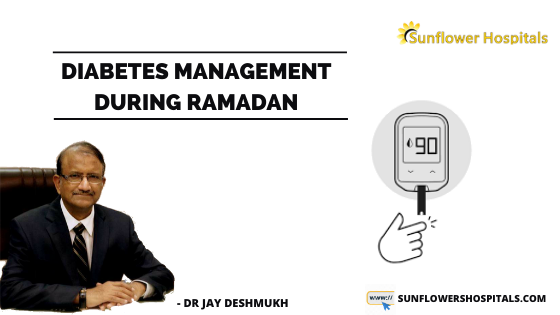What are the risks for diabetics due to prolonged fasting?
Fasting in diabetics can lead to complications that include low blood glucose that is hypoglycaemia or high blood glucose that is hyperglycaemia. It can also lead to dehydration and diabetic ketoacidosis in type 1 diabetics. Hence the decision about fasting in diabetics should be done in consultation with your doctor. This would depend on the severity of your diabetes and the risk involved.
Know your risk before you fest?
It is advisable to see your doctor four weeks before Ramadan to understand your risk category. If your doctor tells you not to fast, you will get the same Thawab, that is a reward. As per the Holy Quran, there are groups of people who may get ill by fasting. Type 1 diabetics should avoid fasting.
When should the blood be tested for glucose levels?
If diabetes is severe or with complications, the blood glucose should be done three to four times per day and at least two times a day if diabetes is not associated with heart, kidneys or brain involvement.
What about adjustments of medications?
Your doctor may change the timings, doses or types of medications during Ramadan. He may change the type and dose of insulin that is administered.
When to break the fast?
All people with diabetes should break the fast if the blood glucose is lower than 70 mg or higher than 300 mg%. The fast should be broken if any acute illness occurs. This may include fever, vomiting or loose stools.
What about exercises during Ramadan? Perform regular light to moderate exercises. Intense exercises are not recommended. These may result in hypoglycaemia or dehydration. Physical exertion involved in Tarawih prayers such as bowing, kneeling and rising should be considered part of your daily exercise
activities.
What should be the diet when the month of Ramadan ends?
Avoid overeating particularly sweets during Eid al-Fitr as this may lead to very high blood glucose. Visit your doctor and take his guidance on changing your treatment back to the previous schedule.
What is dietary advice?
Divide daily calories between Stthoor and War and a maybe an additional one to two snacks. Ensure meals are well balanced. Minimise food that are high in saturated fats like samosas and other fried snacks. Less amount of oil needs to be used, particularly use olive or rap seed oil. Drink plenty of fluids in between two meals. Avoid sweetened drinks or sugary desserts. Have food that has low glycemic index and contains lots of fibre. Beans, rice and granary breads are preferred.
Which drugs are best avoided or taken?
Metformin can be continued and maybe 1000 mg at War and 500 mg at Suhoot: If on Pioglitazone or DPP9 inhibitors, no change is required. If on insulin, make sure that the fluids are taken adequately. These are only illustrative recommendations. The treatment is individualized for each person. The prevalence of diabetes is increasing throughout the world. There will be 642 million people with diabetes by 2040. This increase is going to be seen in Muslim majority countries. Diabetics are exempted from fasting in Ramadan. However, at least in half of the Ramadan month, majority of Muslim diabetics fast. This provides a huge challenge to the diabetics and the health providers as well. There are a few guidelines available for international diabetes organizations. Proper individual education is necessary to the diabetics to pre-vent complications due to diabetes in Ramadan. Ramadan Kareem!


